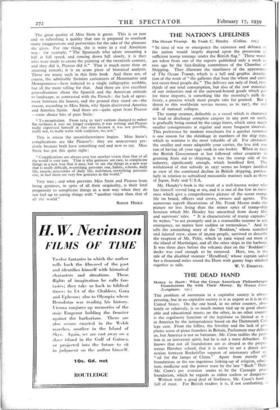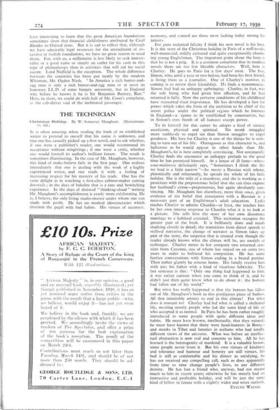THE DEAD HAND
Money to Burn : What the Great American Philanthropic Foundations Do with Their Money. By Horace Coon. (Longmans. 15s.) THE problem of mortmain in a capitalist society is always pressing, but in no capitalist society is it as urgent as it is in the United States. On the one hand, in no other country, abso- lutely or relatively, is so much money tied up in great charit- able and educational trusts; on the other, in no other country is the regulatory function of the legislator so limited as it is in America by the jurisprudence based on the Dartmouth Col- lege case. From the follies, the frivolity and the lack of pro- phetic sense of pious founders in Britain, Parliament may deliver us, but America is not so fortunate. Mr. Coon tackles the prob- lem in an irreverent spirit, but he is not a mere debunker. He knows that not all foundations are as absurd as the prepos- terous Hershey school, that it is naïve to see a direct con- nexion between Rockefeller support of missionary effort an " oil for the lamps of China." Apart from merely sill: foundations or the too ingenious linking-up of religion, educa tion, medicine and the power trust by the late " Buck " Duke. Mr. Coon's pet aversion seems to be the Carnegie peace foundation, which he regards as either useless or dangerou Written with a good deal of liveliness, Mr. Coon's book full of meat. For British readers it is, if not comforting, a:
least interesting to learn that the great American foundations sometimes show that financial childishness attributed by Cecil Rhodes to Oxford dons. But it is sad to reflect that, although we have admirable legal resources for the amendment of ex- cessive or foolish foundations, we have no great reason to need them. For, with us, a millionaire is less likely to seek immor- tality or a good name or simply an outlet for his cash in this type of philanthropy than in activities that will aid his social ascent. Lord Nuffield is the exception. The whole difference between the countries has been put neatly by the modern Whitman, Mr. Ogden Nash. " In America a rich butter-and- egg man is only a rich butter-and-egg man or at most an honorary LL.D. of some hungry university, but in England why before he knows it he is Sir Benjamin Buttery, Bart." Here, in short, we could do with half of Mr. Coon's complaint, as the cab-driver said of the inebriated passenger.











































 Previous page
Previous page